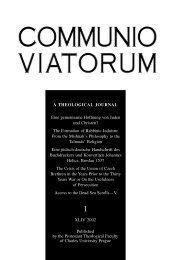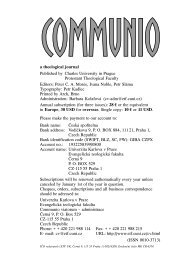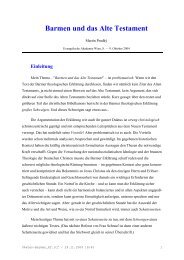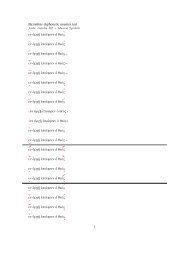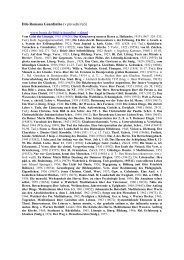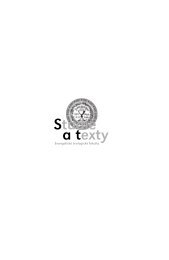A THEOLOGICAL JOURNAL XLIV 2002 Published by the Protestant ...
A THEOLOGICAL JOURNAL XLIV 2002 Published by the Protestant ...
A THEOLOGICAL JOURNAL XLIV 2002 Published by the Protestant ...
You also want an ePaper? Increase the reach of your titles
YUMPU automatically turns print PDFs into web optimized ePapers that Google loves.
IVANA NOBLE (DOLEJäOV¡)<br />
In discussing questions of secularisation, as we do in various ways<br />
in this issue, it strikes me that this concept of <strong>the</strong> profanum, or <strong>the</strong><br />
profane, is well worth considering. For <strong>the</strong> way in which we categorise<br />
this space outside of <strong>the</strong> specifically religious, but still inextricably<br />
linked to it, will determine how we view <strong>the</strong> concept of secularisation,<br />
and whe<strong>the</strong>r we find it useful. It can also force us to<br />
recognise <strong>the</strong> liminal experiences, those which happen in <strong>the</strong> doorway<br />
between <strong>the</strong> temple and <strong>the</strong> space outside.<br />
The profane, in Christian terms <strong>the</strong> extra-ecclesial space, can be<br />
seen ei<strong>the</strong>r as fundamentally distinct from <strong>the</strong> ecclesial space, and<br />
<strong>the</strong>refore opposed to it, or it can be regarded as a continuation of <strong>the</strong><br />
ecclesial space, or perhaps less aggressively, as deeply linked to it. In<br />
<strong>the</strong> first instance, secularisation is generally seen as a threat, as an<br />
attack of <strong>the</strong> ìworld outsideî on <strong>the</strong> ìworld insideî <strong>the</strong> presence of<br />
God. In my earlier metaphor, <strong>the</strong> ca<strong>the</strong>dral is flooded with a vision,<br />
that when it sinks, <strong>the</strong> city will be free. Secularisation, in this understanding,<br />
turns <strong>the</strong> demonic faces from facing outwards to facing<br />
inside <strong>the</strong> temple. They become rationalised, but not relieved of <strong>the</strong>ir<br />
powers. Thus, <strong>the</strong> space ìout <strong>the</strong>reî is a threat to all who are ìinsideî,<br />
or at least a series of temptations, or at best pragmatic negotiations<br />
we have to make to get through <strong>the</strong> throng to take our seats in <strong>the</strong><br />
house of God. This may be something of <strong>the</strong> attitude of Paul, as<br />
exemplified, for example, in Corinthians, where <strong>the</strong> outside world is<br />
recognised, and not exactly condemned, but treated as a necessary<br />
background noise to <strong>the</strong> attempts of <strong>the</strong> body to live in holiness.<br />
In this situation, <strong>the</strong>re tends to be a deep distrust of all that comes<br />
from outside, and it tends to be viewed as potentially threatening.<br />
Whereas a ìhermeneutic of suspicionî may have a role to play here, a<br />
sense of permanent suspicion is essentially destructive, since it allows<br />
for no growth or development. Of course, suspicion of <strong>the</strong> outsider<br />
is not exactly peculiar to <strong>the</strong> church ñ as analysts of <strong>the</strong> present<br />
phobias of Euro-American society, such as Lyotard, Levinas or Metz,<br />
remind us. But within Christianity, it is doubly problematic, since it<br />
seems to run counter to commandments about caring for <strong>the</strong> needy,<br />
for <strong>the</strong> outcast, even for oneís enemies, and to <strong>the</strong> basic tenet of <strong>the</strong><br />
Jewish and Christian traditions (at least a significant part of Christian<br />
tradition) that <strong>the</strong> world is created good. Hence <strong>the</strong> o<strong>the</strong>r tendency, to<br />
222



